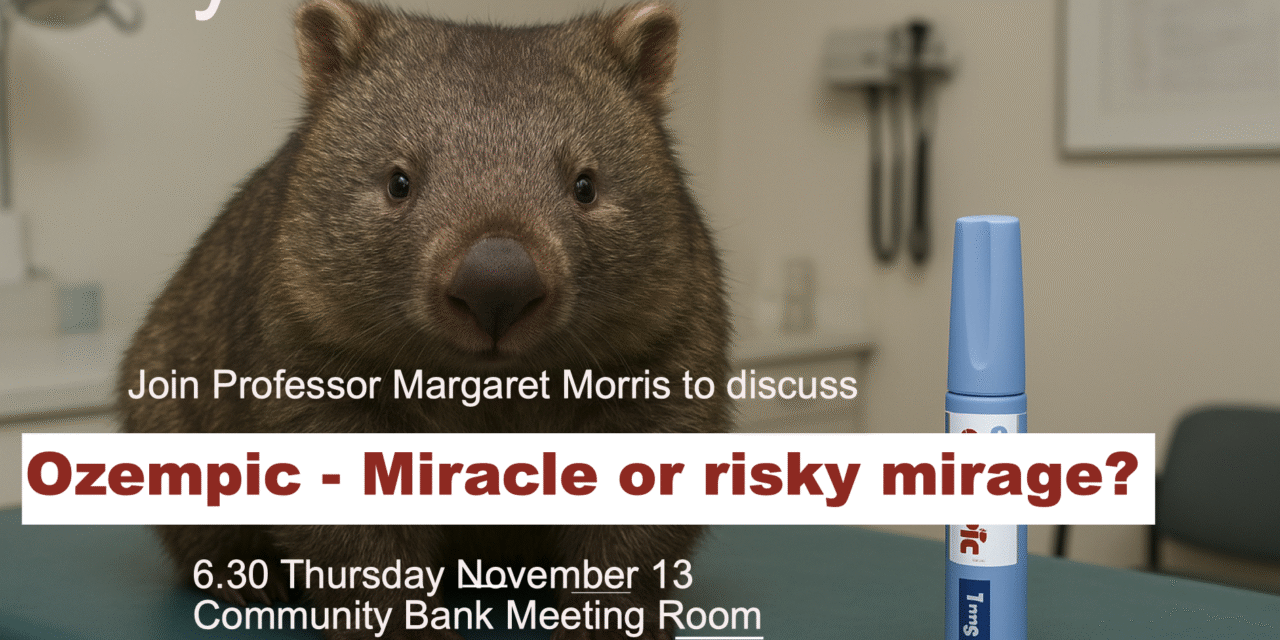The next Daylesford Conversation is about Ozempic, the new widely promoted weight loss drug. Is it a miracle or a risky mirage?
It is not surprising there has been huge demand for Ozempic and similar drugs. Two thirds of Australian adults and one in four children are overweight or obese.
In the medium and longer term being significantly overweight is a major risk for a number of chronic conditions including diabetes and heart disease. Around 1.2 million Australians now have type 2 diabetes – a major increase over the past 30 years.
Being overweight and obese also has social consequences. Attitudes and self perception about being overweight remain generally negative. Overweight people face discrimination in the community and often develop problematic and destructive views of their own bodies. They are likely to repeatedly engage in ineffective diet and exercise programs, sometimes resulting in serious eating problems.
Trying to maintain a healthy weight in a world of cheap, accessible and heavily promoted processed food and drink that is high on sugar, salt and fat is a challenge that most Australians are losing.
But are drugs like Ozempic the solution, or yet another false dawn? These drugs promote insulin production, reduce blood sugar and reduce appetite. This is good for the management of type 2 diabetes with the added benefit of significant weight loss. The majority of people who take GLP-2 agonists, as they are called, lose between 10 and 20 percent of their body weight.
Sounds good, but when you stop taking these drugs, insulin production slows, blood sugar rises and weight is regained. Of those who stop, two thirds regain the weight within a year. That means, to get the benefits you probably have to take the drugs forever.
There is a wider issue too. We now live in an ‘obesogenic’ world. One that is designed to make us overweight. Is it a good idea to solve the problem of societal weight gain, and the illness and disability that it produces, with drugs, or should we address the underlying problems with the food supply and our levels of physical activity?
Join Margaret Morris, Professor of Pharmacoloogy at the University of New South Wales to discuss how drugs like Ozempic fit into the picture of preventing and managing the consequences of weight gain in Australian society.

Professor Margaret Morris, UNSW Sydney, Australia (BSc, PhD Monash) is known nationally and internationally in the research field of obesity, especially around the control of appetite by the brain, and the transmission of obesity across generations. A major focus of her research for over two decades has been impacts of the modern environment (poor diet, stress, smoking, lack of exercise, and combinations thereof) on physical and mental functions. Current research investigates the contributions of dietary fat and sugar to cognitive deficits in rodents, and the role of the gut microbiome. Morris has over 310 publications in leading obesity, neuroscience, pharmacology, endocrinology and physiology journals, reflecting the multidisciplinary nature of her research. A strong advocate for Pharmacology, Morris has played a key role in educating clinicians, scientists and young medical researchers in Pharmacology for more than 35 years across three Universities
Daylesford Conversations are a chance to discuss interesting and important topics that affect the local community and society more generally, and a chance to catch up with people over refreshments.
The Conversations are organised by the Wombat Post and Rotary to promote engagement and well being and are supported by a community strengthening grant from Australia Post.
Date: Thursday 13 November
Time: 6.30-8.00
Venue: Community Bank Meeting Room, 113 Main Road, Hepburn Sprints
Tickets: This is a free event, but please book to help with catering and to make sure you get a seat.
.





